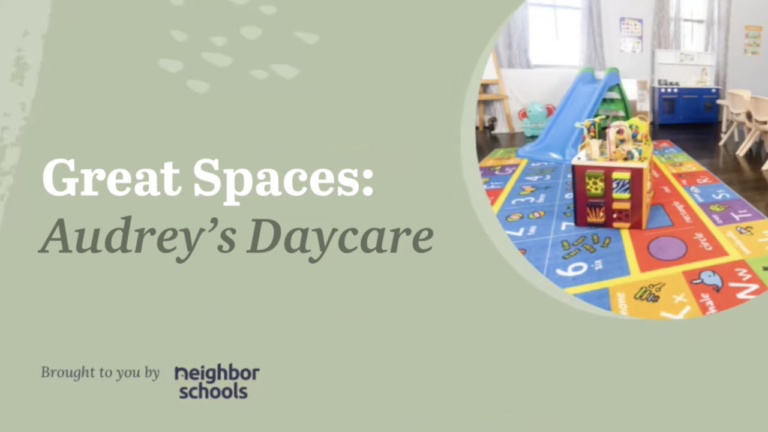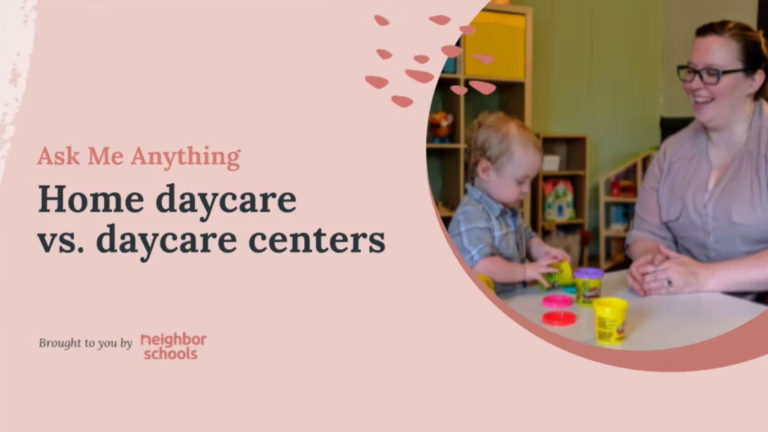They say communication is the key to any relationship—and that’s true for you and the families at your daycare, too. Communicating well helps keep them happy and engaged. It also allows you to provide the kind of top-notch customer service that will have them gushing about you to all their friends.
Here are some tips for improving your communication skills and wowing the families you work with.


Be an Active Listener
Communication isn’t just about the words you say. It’s also about the way you listen to other people. Are you listening to truly understand them, or only to respond to them? When you listen actively, you pay close attention to their words, tone of voice, and body language. You’re engaged and alert, with your focus on the other person. This is a way of showing that you care.
Here are 4 ways to practice active listening with parents at your daycare.
- Give Them Your Full Attention: You know how bad it can feel to try to talk to someone who’s absorbed in their phone or busy doing something else. It’s clear that they’re not paying attention to you. While it’s difficult to get rid of every distraction, you should try not to multitask when speaking with parents. This is especially true for more serious or important conversations.
- Let Them Speak Uninterrupted: You might be excited to share something or ask a question, but it’s best to let the person finish what they’re saying before you follow-up. This demonstrates that you value their thoughts and opinions.
- Keep an Open Mind: When you’re practicing active listening, that’s your only job. Try to avoid jumping to conclusions or letting your own opinions take over. Instead, just listen. This will help you better understand their perspective.
- Focus on the Speaker, Not Yourself: It’s natural to start thinking about your response before the other person is even done speaking, especially in stressful conversations. And even if it’s not a high-stakes interaction, you might just be thinking about what you’re going to make for dinner. But do your best to try to focus on the other person while they’re speaking. That might mean you need to ask for a moment to gather your thoughts before you respond, and that’s totally fine.


How to Be Personable and Professional
Over time, you can develop close relationships with the families in your program, so it’s natural to speak to them in a casual and friendly way. But it’s important to still be professional—after all, they’re your customers. Here are 4 tips to help you strike the right balance between personable and professional when speaking with parents.
- Be Authentic, Not Nosy: Being slightly informal can make people feel more relaxed around you. Address parents by their first names and speak to them the way you would with family or friends, for the most part. Small talk works wonders here. You can ask about an upcoming family vacation or weekend plans. Stay away from personal and potentially controversial topics, like race, religion, and politics.
- Be Open, but Don’t Overshare: Keep the intimate details of your life to yourself, especially things like family troubles, personal struggles, finances, and your romantic life. It’s great to connect on lighter topics, such as sports, hobbies, travel, pets, or exciting life events like getting married.
- Be Honest and Remain Positive: Try not to let negative emotions seep into your interactions. For example, if a little one has been crying a lot, mention it, but don’t complain to the parents. They’ll appreciate hearing an honest update that also includes something positive, such as a new activity that their kiddo loved.
- Use Humor When Appropriate: Embrace humor or wit to make parents smile, but be sure to read the room first. If they’ve had a bad day or a negative experience, it’s probably best to steer clear of jokes. Remember that teasing and sarcasm can be risky too—people often misunderstand this kind of humor. And of course, don’t make jokes about age, race, sex, gender identity, citizenship status, disability status, ethnicity, nationality, or any other topic that might make them uncomfortable. When in doubt, don’t say it.
How to Apologize to Parents
Families don’t expect you to be perfect, but they do expect you to be sincere and take action to correct your mistakes. The way that you apologize can help smooth things over and keep your relationship positive. Here are 6 steps to take to make your apology more impactful.
- Listen: Practice active listening as you give them time to share why they’re upset and how the mistake affected them. Resist the urge to interrupt them, but do ask follow-up questions to make sure you understand their perspective.
- Say You’re Sorry: Once you know the problem, you can say the words “I’m sorry.” It’s best to say “I” rather than “we” to make it more personal and show empathy. Be sure to avoid phrases
- Express Empathy: It can be helpful to communicate that you’d feel the same way if you were in their shoes. Saying something like “I imagine how frustrating it must be” before recapping their situation lets them know you understand.
- Explain what happened: Don’t make excuses, but do provide a short explanation about what happened if it makes sense to do so. For example, if a misunderstanding led to the mistake, acknowledging that misunderstanding is a good step to take.
- Make it right: Take steps to correct the mistake and be sure to tell the parent about those actions. It’s also helpful to give them a timeline for how long it will take to fully resolve the issue or follow-up on it. For example, if the parent had a payment issue, you can tell them you’ll have it resolved within a week. If the issue isn’t something you can fix, focus on steps 1 to 4.
- Summarize: End the conversation with a brief summary of what you’ve discussed and what comes next.
The way you communicate with parents is just as important as providing great care. For more tips on communication and customer service for home daycare providers, you can watch the video of our recent community conversation on this topic.






